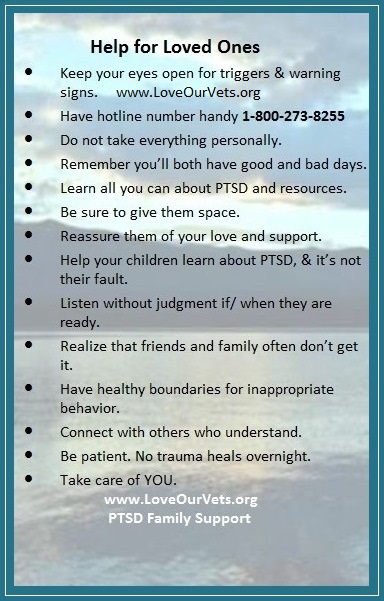(Published in and for the Military Chaplains Association magazine)
PTSD is rampant, and inevitably almost every counselor, therapist, ministry leader or anyone may at some point be sought out for help and support by a loved one of someone struggling with Posttraumatic Stress Disorder. The needs and cries of the spouses, family members and all other loved ones are intense and unique, and unfortunately too often overlooked.
As the wife of a Vietnam veteran who has wrestled with PTSD for over four decades, I know well the agony – along with hope – of the loved ones. Sharing from my own experience, as well as from thousands of others in our LOVE OUR VETS – PTSD Family Support network, here are the three most common (and often desperate) questions asked by loved ones.
1. What is PTSD and what are the symptoms?
Posttraumatic Stress Disorder can affect anyone, whether military-related or not, and it results from exposure to a traumatic experience that is horrific or life threatening. The whole person gets catapulted into emergency mode – fight, flight or freeze survival – and will always stay locked in that emergency mode at some level for the rest of their lives. 24/7 they live as if the original trauma or an impending crisis could occur at any moment. It totally overwhelms their ability to cope so when something triggers them, they have no reserve with which to handle it.
They are people who are reacting normally to an abnormal experience.
Some typical symptoms include flashbacks, avoidance, numbing, putting up walls, withdrawing, hyper-vigilance, irritability, easily startled, memory blocks, sudden bursts of anger or other emotions, difficulty sleeping, nightmares, fear, depression, intrusive thoughts of the trauma, anxiety, substance abuse and other addictive behaviors, difficulty holding a job, relationship problems, and unfortunately sometimes even suicide.
PTSD affects millions just in the U.S. alone, along with all those who love them and care for them. So for every one person battling PTSD, there are probably at least 3-5 others caught in the wake! Its profound impact is not only generational, but also has a powerful ripple effect.
2. How can I help my loved one with PTSD?
You can help but you cannot “fix.” Anything you can do to learn more about PTSD, and about them, will help. This also includes their trauma anniversary dates. Be willing to talk with them about it whenever they’re open. And above all listen.
Words of affection and affirmation are also huge. Since PTSD can seriously erode one’s self-esteem, a little positive encouragement goes a long way.
Most people with PTSD feel unsafe. Anything you can do to help them feel safe is a comfort. Loving physical affection is also important.
Another way you can be supportive is to encourage (not nag) them to get the help they need. It may be talking with their Chaplain, going to a counselor, finding online support, a VA support group, a Pointman group, AA, etc. (see www.LoveOurVets.org for more resources.)
Finally, pray for them. And with them if they are willing. Faith and love have proven to be invaluable for so many who live with the relentless demands of PTSD.
3. Where can I get help for ME?
The key is to hold on to you as you love them. When loved ones take care of themselves and remain mindful of their own needs, they have more strength from which to draw.
One essential need is for your own support. Do you have a counselor for YOU? Also, it is crucial that you connect with other spouses and loved ones who truly understand and can encourage you on the journey. (See www.LoveOurVets.org for helpful resources and Support Network.)
Many loved ones have found the book LOVE OUR VETS: Restoring Hope for Families of Veterans with PTSD to be a lifeline. It focuses on the real needs and cries of the loved ones and how we can and need to take care of us in the day and night post-war battles of PTSD.
Finally, remember there is HOPE! Too many only convey doom and gloom. Those with PTSD and their loved ones need to know that is it entirely possible to live successfully in a loving fulfilling relationship in spite of the PTSD. They can learn to thrive again. I know… because my veteran husband and I do. With God, nothing is impossible!
Welby O’Brien is crazy about her veteran husband, and together they find fulfillment as they face the relentless challenges of PTSD. With a master’s degree in counseling, she has authored the books Formerly A Wife (divorce support) and Goodbye for Now (grief support), as well as contributed to Chicken Soup for the Soul (“Divorce and Recovery” and “Spirit of America”), and Shepherding Women in Pain. And for the loved ones of those with PTSD, LOVE OUR VETS: Restoring Hope for Families of Veterans with PTSD . Welby has been welcomed as a guest speaker across the country, and on radio and television. Welby initiated and continues to facilitate the spouse and family support network known as Love Our Vets – PTSD Family Support, LLC.








